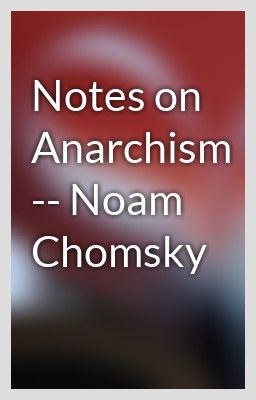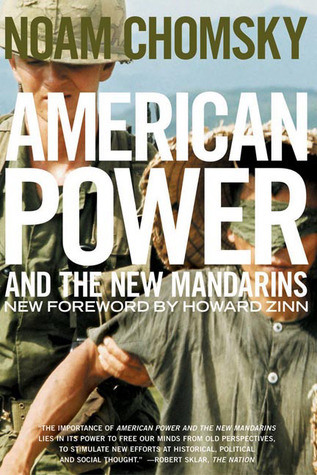In 1982-83, I conducted an interview with Noam Chomsky (by mail! there was no internet back then, or at least one accessible to the general public). It was published in the Open Road news journal, then the highest circulation English language anarchist publication (it’s circulation peaked at around 14,000). The interview reflects many of my own concerns at the time. Chomsky himself was fairly pessimistic back then regarding the human prospect. During the time over which the interview was conducted, the U.S. backed Rios Montt regime in Guatemala was murdering literally tens of thousands of people, largely among the indigenous peasant population. I note that Rios Montt has, just this month, some 30 years later, been convicted in Guatemala of genocide but the conviction has already been overturned. Space limitations prevented me from including excerpts from this interview in Volume Three of Anarchism: A Documentary History of Libertarian Ideas, now available from AK Press.
 The Manufacture of Consent: An Interview With Noam Chomsky
The Manufacture of Consent: An Interview With Noam Chomsky
Today you are probably best known as a critic of U.S. foreign policy. What sort of audience are you trying to reach? Are you afraid that you may just be preaching to the converted?
I’m aware of the danger, but don’t feel that it is real. The major groups of “the converted”—that is, the deeply indoctrinated with naive and immutable quasi-religious beliefs—are the mainstream elite intelligentsia. But they are much too well-disciplined to listen to anything I have to say, and they know of it, if at all, only through the fabrications of various party-liners or their own incomprehension of anything that parts from doctrinal purity The reaction among various Marxists sects and the like is similar, and for similar reasons.
The audience I try to reach, and to some limited extent do reach, is a different one: partly, activists of a less doctrinaire sort than the mainstream liberal intelligentsia and sectarian Marxists, partly the kind of general interested audience that one finds everywhere: around universities (primarily students), church groups, and so on.
I’m not trying to convert, but to inform. I don’t want people to believe me, any more than they should believe the party line I’m criticizing—academic authority, the media, the overt state propagandists, or whatever. In talks and in print, I try to stress what I think is true: that with a little willingness to explore and use one’s mind, it is possible to discover a good deal about the social and political world that is generally hidden. I feel that I’ve achieved something if people are encouraged to take up this challenge and learn for themselves.
There are a vast number of people who are uninformed and heavily propagandized, but fundamentally decent. The propaganda that inundates them is effective when unchallenged, but much of it goes only skin deep. If they can be brought to raise questions and apply their decent instincts and basic intelligence, many people quickly escape the confines of the doctrinal system and are willing to do something to help others who are really suffering and oppressed.
This is naturally less true of better-educated and “more sophisticated” (that is, more effectively indoctrinated) groups who are both the agents and often the most deluded victims of the propaganda system.
What position do you think North American anti-authoritarians should take with regard to Third World liberation movements, especially the more authoritarian, Leninist/Maoist type of movement? Do you think our first priority should be to simply oppose U.S. imperialism?
The U.S. has not been elected God, and has no authority to impose its will by violence in the Third World. Apart from the matter of principle, some familiarity with recent history shows clearly enough the effects of its benevolence, in Central America and the Caribbean for many years, in Southeast Asia, and elsewhere. Any honest person will therefore oppose and attempt to block such intervention, exactly as in the case of subversion or aggression by any other power.
This truism aside, our attitude towards Third World “liberation movements” should be to find out and tell the truth about them. Where we can do something to defend people who are oppressed, to alleviate suffering, or to expand the scope of freedom, we should do so, though the best we can do, quite often, is to keep our bloody hands out of their affairs. We should also try to offer constructive assistance to people attempting to overcome centuries of misery and oppression, in part because it is just and right, in part out of a recognition of what the plague of European civilization has created as it spread through the world. Outside intervention regularly tends to enhance the authoritarian and oppressive elements in these movements, and in fact is often designed to achieve this end (Cuba and Nicaragua are two obvious examples).
It is not clear that there exists any way for most of the people of the Third World to overcome the enormous problems they face, which transcend anything in our historical experience. Whatever slight chance there might be for decent prospects are reduced or eliminated by the violence of the great powers, in part motivated by fear that successful development will take place outside of their control, with a “demonstration effect” that will undermine their dominance elsewhere. These are some of the facts of the world that have to be faced. It is easy to preach to the Third World, a little more difficult to offer constructive recommendations.
Has there been a resurgence of left-wing political activity in the U.S. in the past couple of years?
First, the alleged decline of activism in the 1970s was partly mythical. This was, after all, the period of the rise of the feminist and ecological movements, and much else. In fact, there remained from the 1960s a proliferation of activists groups of many sorts, doing valuable work, generally locally oriented, and many new people joined or began afresh. As the state gradually returned to its natural stance of militancy, subversion and aggression after its partial failures in Vietnam, and as the economic crisis deepened, this activism quickly emerged to public view.
Yet in Radical Priorities, you deny that either feminism or the ecology movement pose a real threat to capitalism—presumably the demands of both movements can be met within the capitalist system. Do you see any revolutionary potential in these movements, or do you think that the working class remains the most likely agent of revolutionary transformation?
The feminist movement, and to some extent the ecology movement, have, I think, had a significant and lasting effect on social thought and practice. But it should be recognized that capitalism can easily accommodate the idea that individuals are interchangeable tools of production and that the environment should be maintained to be exploited by the masters of the economic and political system. A radical and emancipatory movement is not necessarily anti- capitalist. There are many forms of authority and domination apart from those of the capitalist system; correspondingly, there are many forms of “revolutionary transformation.” It doesn’t seem to me a matter of “one or the other,” as your formulation tends to suggest.
Isn’t industrialism itself becoming obsolete?
Industrialism is far from obsolete. The vast majority of the human race has not even entered the industrial era, or has barely entered it, and in the advanced industrial societies the production of useful goods poses real and imminent problems. One major problem of advanced industrial societies—England, and now the U.S.—is that the capacity for useful production is to a certain extent being lost, a fact that has been emphasized for many years by Seymour Melman, among others.
Do you see any prospects for a libertarian social movement emerging in the U.S.?
Quite often, one tends to find libertarian elements in the various activist groups that are continually forming, disappearing, and transmuting into something else. One of the healthy aspects of American society and culture is the relatively low level of deference to privilege and a general skepticism about hierarchy and authority. I emphasize “relatively”; there is a long way to go. The lack of any live socialist tradition or any party structure also serves to make the U.S. different from other capitalist industrial societies in this respect: on the one hand, it leads to a lack of continuity at the intellectual or activist-organizational levels and a generally shifting and evanescent quality to much that happens here; on the other hand, it often leads to openness and innovation, which helps foster libertarian tendencies that often have quite deep roots, I think. I wouldn’t hazard a guess as to where it will lead.
Many of your political writings are directed toward the “new mandarins,” the intellectual servants of American power and interests. Why do you think it is important to expose the collusion between intellectuals and the state?
It has been recognized for many years that “the manufacture of consent” is a major task in societies where obedience cannot be ensured by violence. Whether they are aware of it or not, a substantial part of the intelligentsia commit themselves to this task. The result is a system of indoctrination that is often remarkable in its effectiveness. The first step in freeing oneself from its grip is to recognize that it exists, to come to understand that the pretended objectivity and neutrality of social and political commentary, or simply news reporting, masks presuppositions and ideological principles that should be challenged, and that often collapse very quickly when exposed.
Until people free themselves from the system of indoctrination, they will continue to support the violence of existing institutions. If they can free themselves, they can often combat it effectively in countries such as ours, where the level of institutionalized violence is relatively low, for the privileged at least. So I think it is important to continually bring out the ongoing collusion, whether it is tacit and subconscious or quite consciously undertaken.
This is unending task, since the major institutions and their servants naturally never cease to construct the perceived world in the form that suits their needs. It is a great mistake to believe that once the lies of the propaganda system have been exposed about, say, the Vietnam war, then it is pointless to take the topic up again. On the contrary, the intelligentsia will maintain their natural commitment to restoring the shattered faith and do so in the course of time, quite effectively if unchallenged.
As a self-described “statistical error,” meaning that people with your sort of political views are generally excluded from prominent positions in the U.S., how do you see yourself as an intellectual teaching at a major American university, in your role as a member of the very intelligentsia you criticize, and in relation to your students?
In fact, I have very little contact with the so-called academic or intellectual community, apart from a few friends and colleagues. With regard to students, the matter is different. They are in a phase of their lives when they are uniquely able to question and explore. They haven’t been completely socialized.
It is, in fact, quite striking to see how differently students and faculty respond to issues involving the university or the larger society. Take just one rather typical example. A few years ago MIT in effect arranged to sell about 1/3 of the nuclear engineering department to the Shah of Iran. When the scandal surfaced, there was much uproar on campus, leading to a student referendum that showed about 80% opposed. There was also a series of well-attended faculty meetings (a rare event), which led to a vote in which about 80% approved.
The faculty are simply the students of a few years ago, but the difference in reaction, on a matter of simple academic freedom apart from the obvious broader implications, reflects the fact that they are now a functional part of the institutional structure of power. It is that step towards acceptance and obedience that it is important to try to prevent. Once it has been taken, the rest is fairly predictable.
So you think a large American university is a suitable place for free education and independent thought?
Insofar as the universities provide the opportunities for free inquiry and expression, it would be crazy not to make use of them, while trying to expand these opportunities. This can be done; it was done quite effectively, in fact, by the student movement of the 1960s, one reason why it was so hated and why it is so maligned by the custodians of history, whose privilege and authority were threatened by the student pressure for free inquiry and who now have to mask their real fears by the pretense that the main thrust of the student movement was totalitarian, Stalinist, opposed to academic freedom, and so on. There is a whole literature of falsification on this topic, which is naturally very highly regarded in intellectual circles.
Anarchists, from Godwin to Goodman, have developed libertarian theories of education very critical of conventional, state-controlled education systems. Do you have any thoughts on this libertarian tradition of educational thought?
I think it often effectively expressed crucially important values. Schools function in many ways as instruments of indoctrination, not only in the content of what is taught, but in the style and manner of teaching and organization, from the earliest years.
Students are rewarded for obedience and passivity—one result is that in the elite institutions students are often pre-selected for these traits and are more effectively indoctrinated than elsewhere.
These are not laws of nature. It is possible in principle for schools to foster the creative impulses that are rather natural from childhood on and to encourage a constant willingness to challenge established doctrine and authority. In fact, this comes close to being true in advanced work in the natural sciences, though very rarely elsewhere. For just this reason, training in the natural sciences might not be a bad way to prepare oneself for a life of serious engagement in social and political issues.
A bit of personal good fortune is that up to high school, I was in such school—one that was Deweyan, not libertarian in our sense, but that did encourage independent thought and self-realization in the best sense. It wasn’t until I entered a city high school, for example, that I discovered, to my surprise, that I was a good student. It was assumed in my earlier school experience that everyone was. Insofar as students were “measured,” it was not against one another but against what they could accomplish.
Such schooling is fundamentally subversive, in the best sense, and therefore rarely undertaken, but it is possible even within the institutional constraints of our societies as they now exist, and the effort to create and expand such possibilities merits much effort and struggle. This is most important within the state educational system, where the overwhelming majority of the population is educated, or mis-educated.
You have argued that your linguistic theories have revolutionary implications. Why do you feel that your theoretical work in linguistics is important, and what is the relation between that work, your political views and social liberation in general? In other words, what do innate structures and generative grammar have to do with human emancipation?
A word of caution: I don’t argue that my linguistic theories have revolutionary implications. Rather, that they are merely suggestive as to the form that a libertarian social theory might assume. One shouldn’t claim more than can be shown. Surely one cannot simply deduce social any political consequences from any insights into language. Rather, it is perhaps possible to begin to perceive, if only dimly, how innate structures of mind may lead to an extraordinary richness of understanding, and may underlie and enter human action and thought. On this basis one may hope—it is only a hope—to be able to show, some day, that structures of authority and control limit and distort intrinsic human capacities and needs, and to lay a theoretical basis for a social theory that eventuates in practical ideas as to how to overcome them. But there are huge gaps in any such argument, something I’ve always taken pains to emphasize.
My own hopes and intuitions are that self-fulfilling and creative work is a fundamental human need, and that the pleasures of a challenge met, a work well done, the exercise of skill and craftsmanship, are real and significant, and are an essential part of a full and meaningful life, The same is true of the opportunity to understand and enjoy the achievements of others, which often go beyond what we ourselves can do, and to work constructively in cooperation with others.
 You have described yourself as a “derivative fellow traveler” of anarchism and as an “anarchist socialist.” Just how do you see yourself in relation to anarchism as a philosophy, and anarchism as a movement?
You have described yourself as a “derivative fellow traveler” of anarchism and as an “anarchist socialist.” Just how do you see yourself in relation to anarchism as a philosophy, and anarchism as a movement?
What I think is most important about anarchism as a “philosophy” (a term I’m uncomfortable with) is its recognition that there is and will always be a need to discover and overcome structures of hierarchy, authority and domination and constraints on freedom: slavery, wage-slavery, racism, sexism, authoritarian schools, etc., forever. If human society progresses, overcoming some of these forms of oppression, it will uncover others, particularly as we move from confronting animal problems to confronting human problems, in Marx’s phrase.
Anarchism does not legislate ultimate solutions to these problems. I see it as a rather practical “philosophy,” inspired by a vision of the future that is more free and more conducive to a wide range of human needs, many of which are in no position even to identify under the intellectual and material constraints of our present existence.
We will each commit ourselves to the problems we feel most pressing, but should be ready to learn from others about the limitations of our own conceptions and understanding, which will always be substantial. It is only in this sense that anarchism can be a “movement.” It won’t be a party with members and a finished doctrine.
How did you come to embrace such ideas? Is it true you were influenced by the kibbutz movement in Israel when you were young?
Yes, I was influenced by the kibbutz movement, and in fact lived for a while on a kibbutz and almost stayed on. I think there is much of value in the kibbutz experience, but we must also not forget (as I have sometimes tended to do) that the historical particularity of the kibbutz movement in Israel embodies many serious flaws, sometimes crimes. One should also explore other facets of the experience, for example, the kinds of coercion that arise from the need for acceptance in a closely-knit community, not a small topic, I think.
I can’t really say how I came to be influenced by anarchist ideas; I can’t remember a time when I was not so influenced.
What, in general, is your opinion of Marx and Marxism?
Marx was a person, not a god. The concept “Marxism” belongs to the history of organized religion, and should not be seriously employed by a free and independent person. Marx was a major intellectual figure and it would be foolish not to learn from him or to value his contributions properly. He was, like anyone, limited in his perceptions and understanding. His personal behavior (not to be confused with his thought) often left much to be desired, to put it mildly. There are also very dangerous and destructive elements in his ideas, some of which underlie the worst elements of Leninist thought and practice.










Leave a Reply